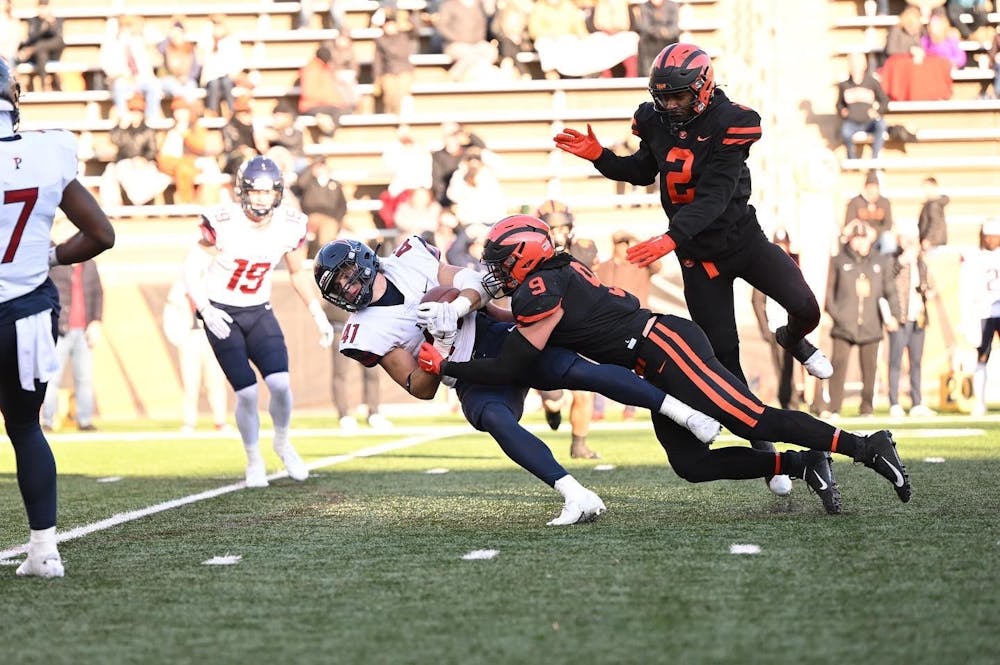Playing a sport at any level comes with increased risk of head injuries like concussions or traumatic brain injuries. “One out of every ten all-contact sport athletes will have a concussion each year according to the CDC,” Notterman Lab M.D./Ph.D. student Nicole Katchur wrote to the Daily Princetonian. “Not every concussion gets reported, so this number is likely a minimum estimate.”
While football is often framed as “the face of concussion risk” in athletics, Katchur emphasized that “concussions can happen in any sport, including swimming, diving, wrestling, basketball, and skiing.” The ‘Prince’ spoke with athletes from different sports at Princeton, who spoke about their experiences with concussions.
At Princeton, the ever-present risk of concussions in athletics is evident. According to first-year women’s rugby player Kenzy Elshazly, she and three other teammates all had concussions at the same time. First-year women’s soccer defender Caroline Kane shared a similar experience, as she told the ‘Prince’ that four women’s soccer players, including herself, have had concussions this season. “[Concussions are an] injury in every sport on campus that you hear about a lot,” Kane said.
Elshazly is a contributing Sports writer for the ‘Prince.’
The impacts of head trauma, however, are far from restricted to the fields of play. “Concussions are debilitating,” noted Katchur. “They can have short-term effects that become chronic and last a whole lifetime.” We are not simply dealing with time away from athletics or minor inconveniences; the effects of head injuries often linger and can be substantially impairing.
Elshazly described the symptoms she experienced during the first week after her first concussion, including a “lack of concentration, drowsiness 24/7, insomnia, migraines all day long, sensitivity to light and sound, dizziness, nausea, and vomiting.” Similarly, first-year Tigers’ football defensive back Nasir Hill reported taking “about a week or so to feel back to normal [post-concussion].”
These symptoms, which are unique to each individual, have direct mental health implications for the student-athlete population on campus. “The challenge of enduring a concussion, in and of itself, can alter mental health,” Katchur continued. “Athletes can feel isolated and frustrated because of lasting symptoms, including memory loss, headaches, and sensitivity to light.”
“[Being] frustrated and exhausted are definitely the biggest things,” Elshazly explains. Elshazly also reported feeling anxious about not knowing the timeline of concussion recovery and the resolution of her symptoms.

Elshazly told the ‘Prince’ that she questioned “If I will get things back [to normal], or if I am permanently like this? It’s been like a week and a half of living [concussed] and now it just feels like I’m going to live like this forever.”
“My most recent concussion was here at Princeton,” Kane told the ‘Prince.’ “That one was pretty bad. I had to miss a scrimmage and two practices.” Along with asking for extensions, Kane took two lectures off from classes and missed course precept meetings due to her concussion.
When injured, student-athletes are extremely motivated to get back to playing, which can make it difficult to let the recovery process take its full course. “I definitely did feel pressure in healing,” said Kane. “Being an athlete here [at Princeton] where sports are very much a part of your experience, there is a lot of pressure to get there and push through.”
Similarly, Hill wrote to the ‘Prince’ that “many athletes try to hide [concussions] and still play through it until they can't.” Emphasizing the struggle between wanting to play and the importance of physical and mental health, Katchur warns that “returning to play too soon can increase the risk of a second concussion and may even result in death.”

As student-athletes are also full-time students, academics add an additional layer of stress to the concussion experience, with the pressure to attend lectures, complete problem sets, and meet deadlines despite symptoms.
“I had a draft for [first-year] writing seminar due [while concussed],” Kane told the ‘Prince.’ “I had to figure out how to ask for an extension with my professor. Luckily, my professor was super understanding, but I think it’s definitely hard to be injured and stay on top of everything for academics.”
“The Princeton in me makes me feel like I have to grind, grind, grind [on work], but I cannot just grind, grind, grind because even if I try, I just get really sick,” Elshazly echoed.
“It will take me around eight hours to do one problem on a [problem set], and then I am just knocked out for 20 hours straight because I am so mentally exhausted,“ Elshazly continued.
Notably, however, many student-athletes shared that at Princeton, the resources on campus for support when experiencing concussion symptoms were vast. This support system includes team athletic trainers, the Office of Disability Services, and residential college deans.
Ultimately, when facing mental health repercussions like extreme exhaustion, frustration, and anxiety, Elshazly expressed concern over how athletes approach the risks of concussions. According to Elshazly, athletes often think, “What are the odds that I’ll be the one to get concussed?”
For Elshazly and other student-athletes, however, they will continue to face the odds and take the risk to continue playing the sports they love.
Ava Seigel is a contributor to the Sports section at the ‘Prince.’
Please direct any corrections requests to corrections[at]dailyprincetonian.com.








